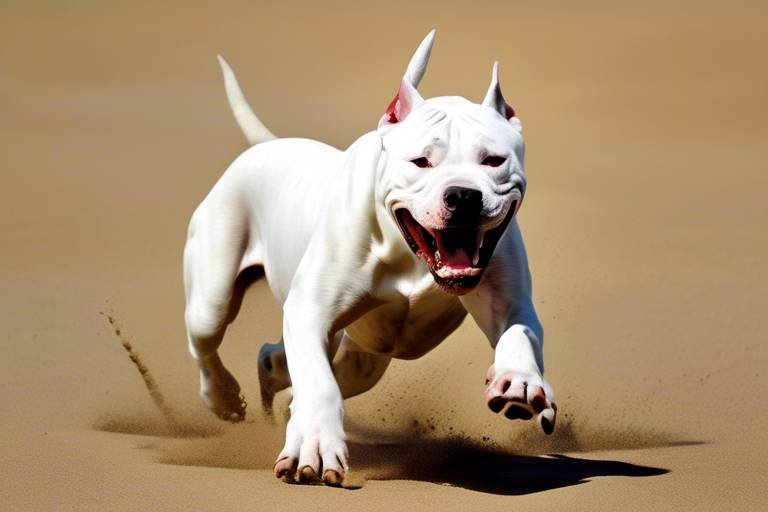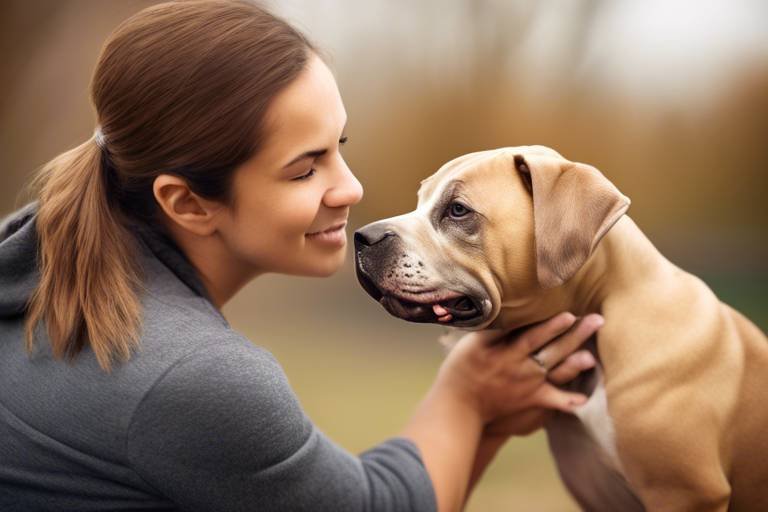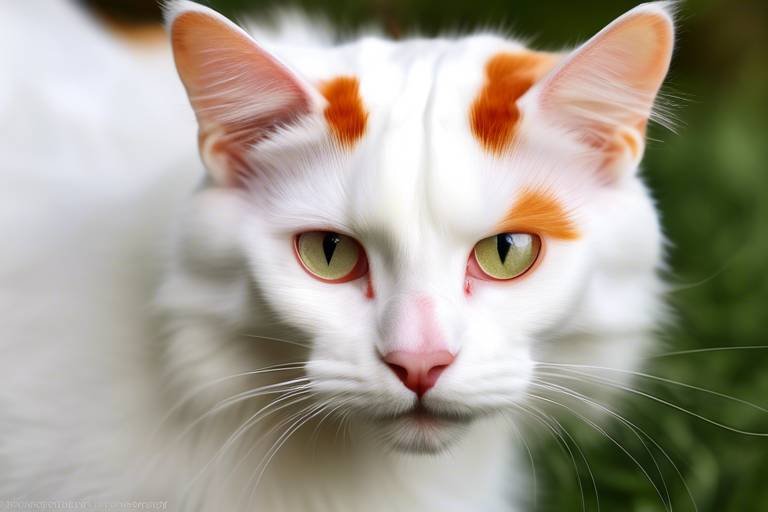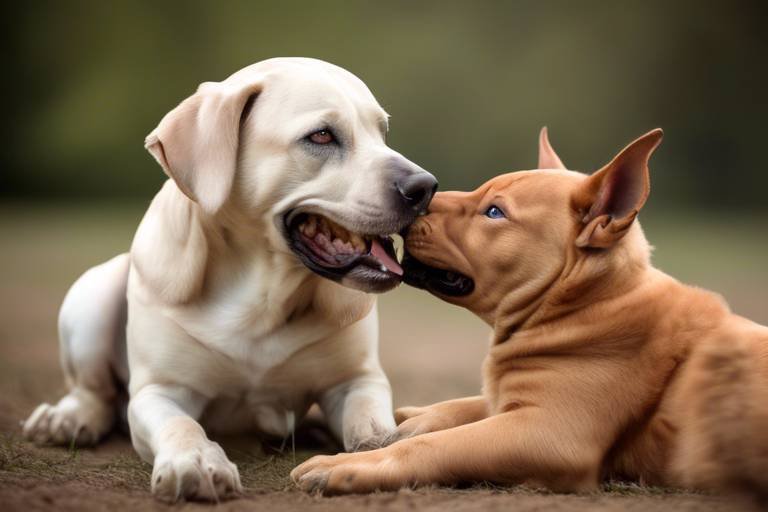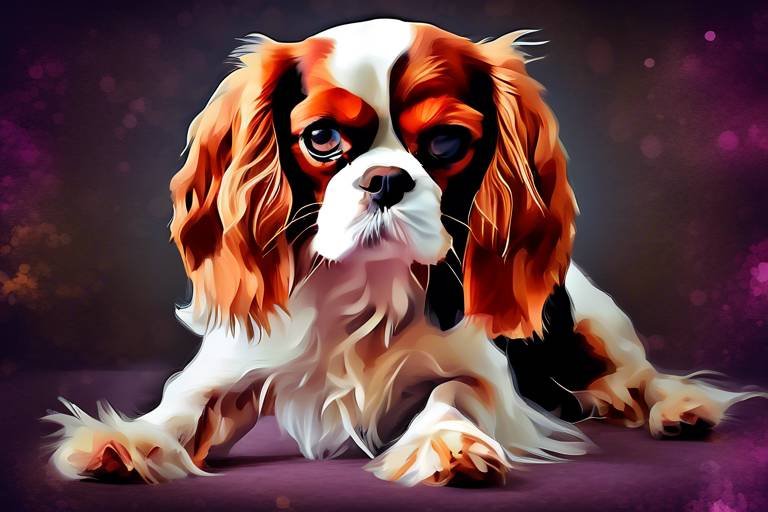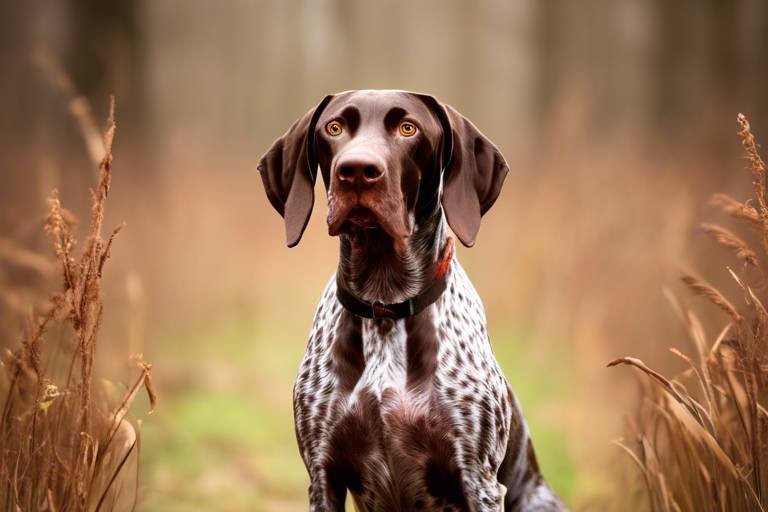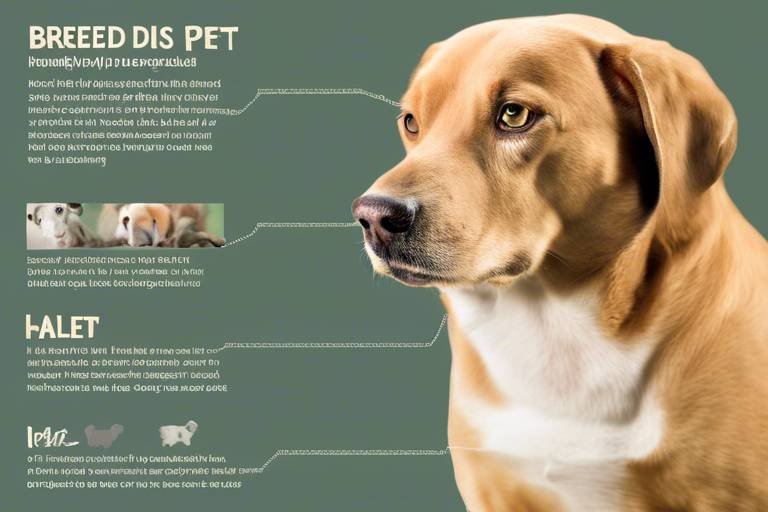The Playful Spirit of the Dogo Argentino
The Dogo Argentino is not just a dog; it's a vibrant companion, bursting with energy and affection. Known for their loyalty and playful nature, these dogs embody a zest for life that is truly contagious. Imagine a friend who is always ready for an adventure, whether it’s a game of fetch in the backyard or a long hike through the woods. That’s the essence of the Dogo Argentino! Their playful spirit makes them not just pets, but integral members of the family, always eager to be involved in daily activities.
One of the most charming aspects of the Dogo Argentino is their ability to connect with people. They thrive on human interaction and are known to form strong bonds with their owners. This breed has a unique way of making you feel loved and appreciated. Have you ever had a dog that seems to understand your moods? The Dogo Argentino does just that! Their intuitive nature allows them to sense when you need a friend, and they respond with playful antics that can easily turn a frown into laughter.
Moreover, their playful demeanor is complemented by a protective instinct, making them excellent family dogs. They are not just about fun and games; they take their role as guardians seriously. This balance of playfulness and protection means that while they will happily romp around with your children, they are also vigilant and ready to defend their loved ones if necessary. It’s like having a gentle giant who is also a fierce protector!
The Dogo Argentino's playful spirit is not just limited to their interactions with humans. They also enjoy engaging with other pets, provided they are well-socialized from an early age. Think of them as the life of the party—always ready to play, whether it’s with toys, balls, or even other dogs. Their playful nature encourages an active lifestyle, which is beneficial not only for them but for their owners as well. Who wouldn’t want a dog that keeps you on your toes and encourages you to get outside and enjoy life?
In summary, the Dogo Argentino is a breed that exemplifies the true meaning of companionship. With their playful spirit, loyalty, and protective nature, they make for exceptional family pets. If you’re looking for a dog that will fill your home with joy and excitement, the Dogo Argentino might just be the perfect fit for you!
- Are Dogo Argentinos good with children?
Yes, they are known to be affectionate and protective, making them great companions for families with children. - How much exercise do Dogo Argentinos need?
Dogo Argentinos require regular exercise to keep them happy and healthy. Daily walks and playtime are essential. - Are Dogo Argentinos easy to train?
They are intelligent dogs, but they can be strong-willed. Consistent training and socialization are key to raising a well-behaved dog. - What health issues are common in Dogo Argentinos?
They can be prone to conditions like hip dysplasia and certain skin issues, so regular vet check-ups are important.
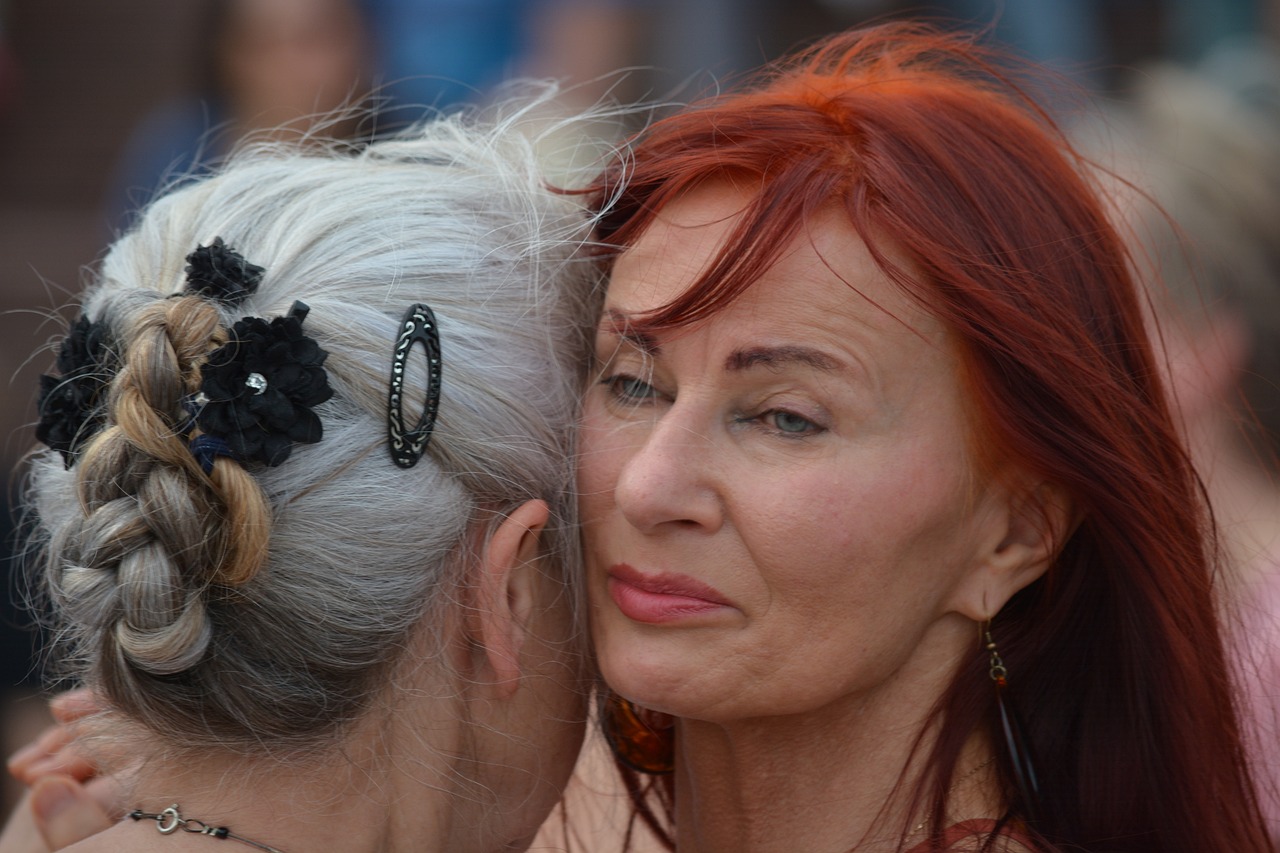
History of the Dogo Argentino
The Dogo Argentino is not just a dog; it's a testament to a rich history that intertwines the rugged landscapes of Argentina with the spirit of adventure. Developed in the early 20th century by Dr. Antonio Nores Martinez, this breed was primarily aimed at big-game hunting, specifically for animals like wild boar and puma. Imagine a time when hunters needed a reliable companion, one that could not only track but also protect them in the wild—this is where the Dogo Argentino truly shines.
Dr. Martinez envisioned a dog that combined the strength and tenacity of various breeds, including the Bulldog, Great Pyrenees, Boxer, and Irish Wolfhound. By mixing these breeds, he aimed to create a powerful yet agile dog that could handle the challenges of hunting in the diverse terrains of Argentina. The result? A breed that is not only muscular and athletic but also possesses a keen intelligence and an affectionate nature.
As the Dogo Argentino gained popularity, it became more than just a hunting companion. Its loyalty and protective instincts made it a beloved family pet, especially among those who appreciated its playful spirit. The breed quickly adapted to various roles, from being a guardian of livestock to a cherished member of the family. This adaptability speaks volumes about the Dogo Argentino's temperament and ability to bond with humans.
However, the journey of the Dogo Argentino has not been without challenges. Throughout its history, it has faced scrutiny and misconceptions, often being labeled as aggressive due to its powerful stature. Yet, those who truly understand the breed know that with proper training and socialization, Dogo Argentinos can be gentle giants, thriving in family environments. Understanding this history is crucial for anyone considering bringing a Dogo Argentino into their home, as it highlights the importance of nurturing their natural instincts while fostering a loving relationship.
In summary, the history of the Dogo Argentino is a rich tapestry of purpose, loyalty, and adaptability. From its origins as a big-game hunter to its role as a family companion, this breed embodies a spirit that is both playful and protective. As we delve deeper into the unique characteristics of the Dogo Argentino, we can appreciate not just what they are today, but also the journey that has shaped them into the beloved companions they are.
- What is the primary purpose of the Dogo Argentino? The Dogo Argentino was originally bred for big-game hunting, but today they are also cherished as family pets and protectors.
- Are Dogo Argentinos good with children? Yes, they are known for their affectionate nature and can be great companions for children when properly trained and socialized.
- How much exercise do Dogo Argentinos need? Dogo Argentinos are active dogs that require regular exercise, including walks, playtime, and mental stimulation.
- What kind of training is best for Dogo Argentinos? Positive reinforcement training methods work best, along with early socialization to ensure they grow into well-mannered adults.

Physical Characteristics
The Dogo Argentino is a breed that captures attention with its impressive physical traits. These dogs are not just beautiful; they embody strength and grace. Typically, they weigh between 80 to 100 pounds and stand around 24 to 27 inches tall at the shoulder. Their robust build is a testament to their origins as big-game hunters, designed to tackle challenging terrains and formidable prey. When you see a Dogo Argentino, you can't help but admire their athletic physique, which is both powerful and elegant.
One of the most striking features of the Dogo Argentino is its short, smooth coat. The breed predominantly showcases a pure white coat, which not only highlights their muscular structure but also gives them a regal appearance. Occasionally, you might spot a Dogo with patches of color—these variations add a unique touch to their look while still emphasizing their distinctive heritage. It's like wearing a tailored suit with just the right amount of flair!
In addition to their coat, the Dogo Argentino has several distinctive features that contribute to its overall allure. Their strong head and powerful jaws are not just for show; they reflect the breed's history as a protector and hunter. Coupled with expressive, intelligent eyes, these features convey a sense of alertness and awareness. You might find yourself captivated by their gaze, which seems to reflect their playful spirit and unwavering loyalty.
To give you a clearer picture of their physical characteristics, here’s a quick overview in a table format:
| Characteristic | Description |
|---|---|
| Weight | 80 to 100 pounds |
| Height | 24 to 27 inches |
| Coat | Short, smooth, predominantly white with occasional patches |
| Distinctive Features | Strong head, powerful jaws, expressive eyes |
The Dogo Argentino is more than just a pretty face; it's a breed that embodies a harmonious blend of strength and elegance. Whether they're bounding through a field or lounging at your feet, their physical presence is both commanding and comforting. As a potential owner, understanding these characteristics will help you appreciate the breed's unique charm and the special bond you can form with them.
- Are Dogo Argentinos good family pets? Yes, they are known for their loyalty and protective nature, making them excellent companions for families.
- How much exercise do Dogo Argentinos need? They require regular exercise to maintain their health and happiness, ideally through daily walks and playtime.
- Do Dogo Argentinos shed a lot? They have a short coat that sheds moderately, so regular grooming is recommended.
- Are Dogo Argentinos good with children? Yes, they are generally good with children, but early socialization is important to ensure they are well-adjusted.
Size and Build
The Dogo Argentino is a breed that commands attention, not just because of its striking appearance but also due to its impressive size and robust build. Typically, these dogs weigh between 80 to 100 pounds and stand about 24 to 27 inches tall
What makes the Dogo Argentino particularly fascinating is how its size contributes to its personality. Their impressive stature is complemented by a strong, athletic frame, making them not only powerful but also incredibly agile. It’s like having a gentle giant in your home—one that can be both a playful companion and a formidable protector. Their build allows them to be versatile, excelling in various roles, from family pets to working dogs.
Moreover, the breed's strong bones and muscular structure provide them with the stamina needed for an active lifestyle. Dogo Argentinos thrive on physical activity, and their size allows them to engage in a variety of sports, including agility training and weight pulling. They are not just couch potatoes; they need to move! A well-exercised Dogo Argentino is a happy Dogo Argentino. This need for activity means that owners must be prepared to provide ample exercise and mental stimulation.
To give you a clearer picture, here's a quick overview of their size and build characteristics:
| Characteristic | Details |
|---|---|
| Weight | 80 to 100 pounds |
| Height | 24 to 27 inches |
| Body Type | Muscular and athletic |
| Stamina | High; requires regular exercise |
In summary, the size and build of the Dogo Argentino are not just about aesthetics. They play a crucial role in the dog's overall temperament and suitability for various activities. When you choose a Dogo Argentino, you’re not just adopting a pet; you’re welcoming a loyal companion that embodies strength, agility, and a zest for life. So, are you ready to embrace the adventure that comes with such a dynamic breed?
- What is the average lifespan of a Dogo Argentino?
The average lifespan is around 10 to 15 years, depending on their care and health management. - Are Dogo Argentinos good with children?
Yes, they are known for their affectionate nature and can be great companions for children when properly socialized. - Do Dogo Argentinos require special grooming?
No, their short coat requires minimal grooming, but regular brushing helps reduce shedding. - How much exercise do they need?
They require at least 1 hour of exercise daily to keep them happy and healthy.
Coat and Color
This article explores the unique characteristics, temperament, and playful nature of the Dogo Argentino, a breed known for its loyalty and zest for life. Discover what makes them special companions.
The Dogo Argentino was developed in Argentina for big-game hunting. Understanding its origins helps to appreciate its traits and the role it plays in various activities, including companionship and protection.
Dogo Argentinos are muscular and athletic, exhibiting a striking appearance. Their physical traits, including size, coat, and color, contribute to their reputation as powerful and elegant dogs.
Typically weighing between 80 to 100 pounds, Dogo Argentinos possess a robust build. Their size and strength make them well-suited for various roles, including that of a family protector.
The Dogo Argentino features a short, smooth coat that is predominantly white, which not only enhances its striking appearance but also serves a practical purpose in the breed's original hunting role. The white coat allows for easy visibility in the field, making it easier for hunters to spot their dogs during a hunt. Occasionally, you may notice patches of color, usually in shades of brindle or black, which add a unique flair to their overall look. These patches are not just a random occurrence; they reflect the breed's diverse genetic background and history.
Moreover, the coat of a Dogo Argentino is not just about aesthetics. It plays a significant role in their health and well-being. The short hair requires minimal grooming, which is a plus for busy pet owners. However, it is essential to maintain a regular grooming routine to keep their skin healthy and free from irritations. Bathing them occasionally will help in maintaining the coat’s shine and removing any dirt or allergens that may accumulate.
In terms of color, the breed standard emphasizes the preference for a solid white coat. However, the presence of colored patches is accepted, adding to the dog's individuality. This unique coloration can sometimes lead to misconceptions about their breed, as people may confuse them with other breeds. To clarify, here’s a quick overview of the Dogo Argentino's coat characteristics:
| Coat Characteristics | Description |
|---|---|
| Primary Color | Predominantly White |
| Color Variations | Occasional brindle or black patches |
| Coat Type | Short and smooth |
| Grooming Needs | Low maintenance; occasional brushing recommended |
In conclusion, the coat and color of the Dogo Argentino not only contribute to its stunning appearance but also reflect its heritage and the breed's practical origins. With their distinctive look and minimal grooming needs, they are a fantastic choice for those who appreciate both beauty and functionality in a canine companion.
Known for their playful and affectionate nature, Dogo Argentinos are loyal companions. Their temperament makes them suitable for families, as they are both protective and friendly.
Training is essential for Dogo Argentinos due to their strong will and intelligence. Proper socialization and obedience training ensure they grow into well-mannered adult dogs.
Obedience training is crucial for Dogo Argentinos, as it establishes boundaries and reinforces positive behavior. Consistent training methods help them thrive in various environments.
Early socialization is vital for Dogo Argentinos to interact well with other pets and people. Exposure to different experiences fosters a well-rounded and confident dog.
Like all breeds, Dogo Argentinos are prone to specific health issues. Awareness of these conditions can promote better health and longevity in your pet.
Dogo Argentinos may face health issues such as hip dysplasia and certain skin conditions. Regular veterinary check-ups are essential for early detection and management of these problems.
Preventive care, including vaccinations and a balanced diet, plays a significant role in maintaining the health of Dogo Argentinos. Proper care ensures a happy and active lifestyle for your dog.
- Are Dogo Argentinos good with children? Yes, they are known to be very protective and affectionate towards children.
- How much exercise do Dogo Argentinos need? They require regular exercise to stay healthy and happy, ideally at least an hour a day.
- Do they shed a lot? They have a short coat that sheds minimally, making them relatively low-maintenance in terms of grooming.
- Are Dogo Argentinos easy to train? With consistent training and socialization, they can be quite obedient, but they do require a firm and experienced handler.
Distinctive Features
The Dogo Argentino is not just another breed; it’s a living testament to strength and beauty. One of their most striking features is their strong head, which is proportionate to their robust body. This impressive head houses a pair of expressive eyes that seem to communicate a range of emotions, from playful mischief to unwavering loyalty. These eyes are not only captivating but also serve as a window into their intelligent and alert nature.
When you look at a Dogo Argentino, you can't help but notice their powerful jaws. This feature is a result of their history as big-game hunters, designed to grip and hold prey securely. But don’t let that intimidate you! This strength is paired with a gentle temperament, especially when they are with their families. They are truly a paradox—fierce protectors yet tender companions.
Another distinctive characteristic of the Dogo Argentino is their muscular build. These dogs are not just about looks; their athleticism allows them to be agile and energetic, making them perfect for various activities, from running in the park to participating in dog sports. Their well-defined muscles are a testament to their active lifestyle, and they thrive on exercise and engagement.
In terms of coat, the Dogo Argentino features a short, smooth coat that is predominantly white. This striking color not only adds to their elegance but also serves a practical purpose—it's easy to maintain and keeps them cool in warmer climates. Occasionally, you might spot a Dogo Argentino with patches of color, which adds a unique flair to their appearance. These variations are a nod to their heritage and make each dog truly one-of-a-kind.
To sum it up, the Dogo Argentino is a breed that embodies strength, beauty, and intelligence. Their distinctive features—ranging from their strong head and powerful jaws to their athletic build and elegant coat—combine to create a dog that is not just a pet, but a loyal companion and protector. If you’re considering bringing one into your home, prepare for a relationship filled with love, adventure, and the occasional playful mischief!
- What kind of environment is best for a Dogo Argentino?
These dogs thrive in active households where they can get plenty of exercise and mental stimulation. - Are Dogo Argentinos good with children?
Yes! With proper training and socialization, they are known to be affectionate and protective of children. - How often should I groom my Dogo Argentino?
Due to their short coat, they require minimal grooming, but regular brushing can help reduce shedding. - Do Dogo Argentinos require a lot of training?
Yes, they are intelligent and strong-willed, so consistent training and socialization are essential from a young age.
Temperament and Behavior
The Dogo Argentino is not just a breed; it's a bundle of energy wrapped in a loyal and affectionate package. Known for their playful spirit, these dogs thrive on interaction and companionship. Imagine a loyal friend who’s always ready for a game of fetch or a romp in the park—that’s the essence of the Dogo Argentino! Their playful demeanor is complemented by a strong protective instinct, making them not only great companions but also vigilant guardians of the home.
These dogs are incredibly affectionate and form deep bonds with their families. They are known to be gentle with children, often displaying a patient and playful attitude that can turn any ordinary day into an adventure. However, it’s important to remember that their size and strength mean that supervision is crucial. Just like a big kid in a playground, they might not realize their own strength when playing with smaller pets or children.
In terms of temperament, the Dogo Argentino is often described as confident and intelligent. They possess a natural curiosity that makes them eager to explore their surroundings. This inquisitive nature can sometimes lead to mischief, so consistent guidance is essential. Think of them as the class clown—always looking for the next opportunity to entertain themselves (and you!).
When it comes to behavior, early training and socialization are key. A well-trained Dogo Argentino is not only a joy to be around but also a well-mannered member of the family. They respond well to positive reinforcement, so showering them with praise and rewards during training sessions can work wonders. Just like teaching a child to ride a bike, patience and encouragement go a long way in helping them learn the ropes.
In summary, the Dogo Argentino is a breed that embodies playfulness, affection, and loyalty. With their unique blend of energetic spirit and protective nature, they make for wonderful companions. However, it’s essential to provide them with the right training and socialization to ensure they grow into well-rounded dogs. After all, a happy Dogo Argentino is a well-loved Dogo Argentino!
- Are Dogo Argentinos good with children?
Yes, they are generally very affectionate and gentle with children, making them great family pets. - How much exercise do Dogo Argentinos need?
They require regular exercise, such as daily walks and playtime, to keep them healthy and happy. - Are Dogo Argentinos easy to train?
With consistent training and positive reinforcement, they can be trained effectively, but they do require a firm and patient owner. - What health issues should I be aware of?
Dogo Argentinos can be prone to hip dysplasia and certain skin conditions, so regular vet check-ups are important.

Training and Socialization
Training and socialization are critical components in raising a well-rounded Dogo Argentino. These dogs are not only known for their impressive strength but also for their intelligence and strong-willed nature. It’s essential to start training early to harness their energy positively and to ensure they grow into well-mannered adults. Think of training as building a solid foundation for a house; without it, the structure can become unstable. By establishing clear boundaries and expectations, you pave the way for a harmonious relationship with your furry friend.
Obedience training is particularly important for Dogo Argentinos. This breed thrives on structure and routine, making consistent training methods vital. When you engage in obedience training, you’re not just teaching commands; you’re also fostering a deeper bond with your dog. Imagine teaching your Dogo to sit or stay; these simple commands can prevent potential mishaps and ensure safety in various situations. Moreover, positive reinforcement techniques, such as treats and praise, work wonders in encouraging good behavior. The more you practice, the more your Dogo will understand what you expect from them.
Socialization is another crucial aspect of a Dogo Argentino’s upbringing. Early exposure to a variety of environments, people, and other animals can significantly influence their behavior. Picture this: a young Dogo Argentino meeting different dogs at the park or experiencing bustling city life. These experiences help them become well-adjusted and confident adults. It’s essential to create opportunities for your Dogo to interact with various stimuli, as this will help reduce any fear or aggression towards unfamiliar situations later in life.
Here are some effective socialization techniques to consider:
- Playdates: Arrange playdates with other friendly dogs to encourage positive interactions.
- Public Outings: Take your Dogo to pet-friendly stores or outdoor cafes to expose them to different sights and sounds.
- Training Classes: Enroll in group training classes where your Dogo can learn alongside other dogs and people.
By incorporating these techniques, you’ll help your Dogo Argentino develop into a well-socialized and confident companion. Remember, the goal is to create a positive environment where your dog feels safe and secure, allowing their playful spirit to shine through. This breed is naturally affectionate and loyal, and with the right training and socialization, they can become the perfect family member and protector.
Q: How early should I start training my Dogo Argentino?
A: It's best to start training as early as possible, ideally when they are still a puppy. Early training helps establish good habits and strengthens your bond.
Q: Are Dogo Argentinos good with children?
A: Yes, Dogo Argentinos are generally good with children, especially when properly socialized. They are protective and can be affectionate companions for kids.
Q: How much exercise does a Dogo Argentino need?
A: Dogo Argentinos require regular exercise to stay healthy and happy. Daily walks, playtime, and engaging activities are essential to meet their energy needs.
Q: Can Dogo Argentinos be left alone for long periods?
A: While Dogo Argentinos can tolerate some alone time, they thrive on companionship. Long periods of solitude can lead to boredom and behavioral issues.
Obedience Training
This article explores the unique characteristics, temperament, and playful nature of the Dogo Argentino, a breed known for its loyalty and zest for life. Discover what makes them special companions.
The Dogo Argentino was developed in Argentina for big-game hunting. Understanding its origins helps to appreciate its traits and the role it plays in various activities, including companionship and protection.
Dogo Argentinos are muscular and athletic, exhibiting a striking appearance. Their physical traits, including size, coat, and color, contribute to their reputation as powerful and elegant dogs.
Typically weighing between 80 to 100 pounds, Dogo Argentinos possess a robust build. Their size and strength make them well-suited for various roles, including that of a family protector.
The breed features a short, smooth coat, predominantly white. Occasionally, they may have patches of color, which add to their distinctive look while emphasizing their unique heritage.
Dogo Argentinos have a strong head and jaws, along with expressive eyes. These features not only enhance their appearance but also reflect their alertness and intelligence.
Known for their playful and affectionate nature, Dogo Argentinos are loyal companions. Their temperament makes them suitable for families, as they are both protective and friendly.
Training is essential for Dogo Argentinos due to their strong will and intelligence. Proper socialization and obedience training ensure they grow into well-mannered adult dogs.
Obedience training is crucial for Dogo Argentinos, as it establishes boundaries and reinforces positive behavior. These dogs, while incredibly loyal and loving, can also be quite strong-willed. Therefore, a consistent and firm approach to training is vital. Imagine trying to steer a large ship; without a strong captain at the helm, it could easily go off course. Similarly, your Dogo Argentino needs a steady hand to guide them through their learning journey.
One of the most effective training methods involves positive reinforcement. This means rewarding your dog with treats, praise, or playtime for good behavior. For instance, when your Dogo Argentino sits on command, a tasty treat or a cheerful "good dog!" can reinforce that behavior. Over time, they will associate the command with the action and the reward, making them more likely to repeat it.
Furthermore, it's essential to practice commands regularly. Just like humans benefit from repetition when learning something new, dogs thrive on consistency. Short, frequent training sessions of about 5 to 10 minutes can be more effective than longer sessions that might lead to boredom. Here’s a simple table to illustrate a sample training schedule:
| Day | Command | Duration |
|---|---|---|
| Monday | Sit | 10 minutes |
| Tuesday | Stay | 10 minutes |
| Wednesday | Come | 10 minutes |
| Thursday | Heel | 10 minutes |
| Friday | Down | 10 minutes |
Additionally, incorporating fun into training can make the process enjoyable for both you and your Dogo Argentino. Games like fetch or hide-and-seek can be great ways to reinforce commands in a playful manner. For example, asking your dog to "stay" while you hide and then calling them to "come" can turn training into a delightful game, strengthening your bond while teaching them essential skills.
Like all breeds, Dogo Argentinos are prone to specific health issues. Awareness of these conditions can promote better health and longevity in your pet.
Dogo Argentinos may face health issues such as hip dysplasia and certain skin conditions. Regular veterinary check-ups are essential for early detection and management of these problems.
Preventive care, including vaccinations and a balanced diet, plays a significant role in maintaining the health of Dogo Argentinos. Proper care ensures a happy and active lifestyle for your dog.
- What is the lifespan of a Dogo Argentino? The average lifespan is around 10 to 15 years.
- Are Dogo Argentinos good with children? Yes, they are known to be affectionate and protective, making them great family pets.
- How much exercise do they need? Dogo Argentinos require daily exercise, ideally 1 to 2 hours to stay healthy and happy.
- Do they require a lot of grooming? Their short coat requires minimal grooming, but regular brushing helps keep their coat healthy.
Socialization Techniques
Socialization is a fundamental aspect of raising a happy and well-adjusted Dogo Argentino. These dogs, with their strong will and intelligence, can sometimes be a handful if not properly socialized from a young age. Imagine trying to teach a toddler how to interact with others without giving them the tools they need; it’s pretty much the same for our furry friends. Early exposure to a variety of environments, people, and other animals is crucial in shaping their behavior and temperament.
One effective technique is to start socialization as soon as you bring your Dogo Argentino puppy home. This involves introducing them to different people, including children, adults, and even strangers. It’s essential to ensure these interactions are positive. For instance, you might invite friends over to meet your puppy, allowing them to offer treats and engage in gentle play. This not only helps your dog become comfortable around various people but also fosters trust and affection.
Additionally, exposing your Dogo Argentino to different environments can significantly enhance their adaptability. Take them on car rides, to parks, or even to pet-friendly stores. Each new experience can be an adventure, helping them learn how to react to different sounds, sights, and smells. Remember, the goal is to make these experiences enjoyable, so always reward them with praise or treats when they handle new situations well.
Another vital aspect of socialization is interaction with other dogs. This can be achieved by enrolling your Dogo Argentino in puppy classes or visiting dog parks. However, it’s crucial to monitor these interactions closely. Not all dogs are friendly, and your pup needs to learn how to navigate these social waters. Positive reinforcement goes a long way here too; rewarding your dog for calm behavior around other dogs can reinforce good habits.
To summarize, here are some key socialization techniques for your Dogo Argentino:
- Early Exposure: Introduce your puppy to various people and environments as soon as possible.
- Positive Interactions: Ensure that every experience is positive, using treats and praise to reinforce good behavior.
- Dog Interactions: Facilitate safe interactions with other dogs to teach them social cues.
- Consistent Routine: Regularly expose them to new experiences to maintain their adaptability.
Incorporating these techniques into your training routine will not only help your Dogo Argentino become well-mannered but also a confident and happy companion. Remember, the goal is to create a balanced dog that feels comfortable in any situation, which ultimately leads to a more harmonious home life.
Q1: At what age should I start socializing my Dogo Argentino?
A1: It's best to start socializing your Dogo Argentino as early as 7 to 8 weeks old. The earlier, the better!
Q2: How do I know if my Dogo Argentino is properly socialized?
A2: A well-socialized Dogo Argentino will be comfortable around different people and pets, showing curiosity rather than fear or aggression.
Q3: What should I do if my Dogo Argentino is fearful of new experiences?
A3: Take things slow. Gradually introduce them to new experiences, always ensuring they feel safe. Use treats and praise to encourage positive reactions.
Q4: Can I socialize my adult Dogo Argentino?
A4: Yes! While it may take more time and patience, adult dogs can still learn and adapt to new experiences.

Health Considerations
The Dogo Argentino, like any other breed, comes with its own set of health considerations that every potential owner should be aware of. Understanding these can help ensure that your furry friend enjoys a long, healthy, and vibrant life. This breed is generally robust, but they can be predisposed to certain health issues that may require your attention and care.
One of the most common health concerns for Dogo Argentinos is hip dysplasia. This genetic condition affects the hip joint, leading to arthritis and pain as the dog ages. It’s crucial to monitor your dog’s activity levels and maintain a healthy weight to alleviate stress on their joints. Regular check-ups with your veterinarian can help catch this condition early, potentially mitigating its effects.
Additionally, Dogo Argentinos can experience skin conditions, such as allergies or infections. Their short coat might give the impression that they are less prone to skin issues, but in reality, they can be quite sensitive. Keeping their skin healthy requires regular grooming and attention to any unusual changes in their coat or skin texture.
| Health Issue | Description | Prevention |
|---|---|---|
| Hip Dysplasia | A genetic condition affecting the hip joints, leading to arthritis. | Maintain a healthy weight, regular vet check-ups. |
| Skin Conditions | Allergies or infections that can affect their skin health. | Regular grooming, monitor for skin changes. |
Preventive care is essential for keeping your Dogo Argentino in tip-top shape. This includes regular vaccinations, flea and tick prevention, and a balanced diet tailored to their specific needs. A nutritious diet not only fuels their playful spirit but also supports their overall health. Consult with your veterinarian to determine the best food options that will keep your dog energetic and healthy.
Moreover, exercise plays a vital role in maintaining their health. Dogo Argentinos are active dogs that require ample physical activity to stay fit and happy. Regular walks, playtime, and mental stimulation through training or interactive toys can help prevent obesity and related health issues.
In summary, being proactive about your Dogo Argentino's health can lead to a more fulfilling life for both you and your canine companion. By staying informed and attentive, you can help your Dogo live a healthy, active, and playful life.
- What is the average lifespan of a Dogo Argentino?
The average lifespan is around 10 to 15 years, depending on health and care. - Are Dogo Argentinos prone to any genetic disorders?
Yes, they can be prone to hip dysplasia and certain skin conditions. - How often should I take my Dogo Argentino to the vet?
Regular check-ups are recommended at least once a year, or more frequently if health issues arise. - What kind of diet is best for a Dogo Argentino?
A balanced diet rich in protein, vitamins, and minerals is ideal. Consult your vet for specific recommendations.
Common Health Issues
This article explores the unique characteristics, temperament, and playful nature of the Dogo Argentino, a breed known for its loyalty and zest for life. Discover what makes them special companions.
The Dogo Argentino was developed in Argentina for big-game hunting. Understanding its origins helps to appreciate its traits and the role it plays in various activities, including companionship and protection.
Dogo Argentinos are muscular and athletic, exhibiting a striking appearance. Their physical traits, including size, coat, and color, contribute to their reputation as powerful and elegant dogs.
Typically weighing between 80 to 100 pounds, Dogo Argentinos possess a robust build. Their size and strength make them well-suited for various roles, including that of a family protector.
The breed features a short, smooth coat, predominantly white. Occasionally, they may have patches of color, which add to their distinctive look while emphasizing their unique heritage.
Dogo Argentinos have a strong head and jaws, along with expressive eyes. These features not only enhance their appearance but also reflect their alertness and intelligence.
Known for their playful and affectionate nature, Dogo Argentinos are loyal companions. Their temperament makes them suitable for families, as they are both protective and friendly.
Training is essential for Dogo Argentinos due to their strong will and intelligence. Proper socialization and obedience training ensure they grow into well-mannered adult dogs.
Obedience training is crucial for Dogo Argentinos, as it establishes boundaries and reinforces positive behavior. Consistent training methods help them thrive in various environments.
Early socialization is vital for Dogo Argentinos to interact well with other pets and people. Exposure to different experiences fosters a well-rounded and confident dog.
Like all breeds, Dogo Argentinos are prone to specific health issues. Awareness of these conditions can promote better health and longevity in your pet.
Dogo Argentinos, while generally healthy, can face a few common health concerns that owners should be aware of. One of the most prevalent issues is hip dysplasia, a genetic condition that affects the hip joint, leading to arthritis and discomfort. This condition is particularly common in larger breeds and can significantly impact their quality of life.
Another concern is certain skin conditions, which can arise due to their short coat and exposure to various environments. Allergies or irritants can lead to rashes, itching, and infections if not addressed promptly. Regular grooming and skin checks can help prevent these issues from escalating.
Additionally, Dogo Argentinos may suffer from conditions like cardiomyopathy and ear infections. Cardiomyopathy affects the heart muscle, while ear infections can be a result of their floppy ears, which can trap moisture and debris. Being proactive with veterinary visits is essential for early detection and management of these health issues.
Here’s a quick overview of some common health issues faced by Dogo Argentinos:
| Health Issue | Description |
|---|---|
| Hip Dysplasia | A genetic condition affecting the hip joint, leading to arthritis. |
| Skin Conditions | Rashes and infections due to allergies or irritants. |
| Cardiomyopathy | A heart condition that affects the muscle, leading to serious complications. |
| Ear Infections | Common in breeds with floppy ears, can lead to discomfort and further issues. |
Regular veterinary check-ups are essential for early detection and management of these problems. By keeping an eye on your Dogo Argentino's health, you can ensure they lead a happy and active life.
- What is the lifespan of a Dogo Argentino?
The average lifespan of a Dogo Argentino is around 10 to 12 years, depending on their health and care. - Are Dogo Argentinos good with kids?
Yes, they are known to be protective and affectionate with children, making them great family pets. - How much exercise do Dogo Argentinos need?
They require regular exercise, ideally 1 to 2 hours of physical activity daily, to stay healthy and happy. - Are they easy to train?
With consistent training and positive reinforcement, Dogo Argentinos can be trained effectively, although they may have a stubborn streak.
Preventive Care
This article explores the unique characteristics, temperament, and playful nature of the Dogo Argentino, a breed known for its loyalty and zest for life. Discover what makes them special companions.
The Dogo Argentino was developed in Argentina for big-game hunting. Understanding its origins helps to appreciate its traits and the role it plays in various activities, including companionship and protection.
Dogo Argentinos are muscular and athletic, exhibiting a striking appearance. Their physical traits, including size, coat, and color, contribute to their reputation as powerful and elegant dogs.
Typically weighing between 80 to 100 pounds, Dogo Argentinos possess a robust build. Their size and strength make them well-suited for various roles, including that of a family protector.
The breed features a short, smooth coat, predominantly white. Occasionally, they may have patches of color, which add to their distinctive look while emphasizing their unique heritage.
Dogo Argentinos have a strong head and jaws, along with expressive eyes. These features not only enhance their appearance but also reflect their alertness and intelligence.
Known for their playful and affectionate nature, Dogo Argentinos are loyal companions. Their temperament makes them suitable for families, as they are both protective and friendly.
Training is essential for Dogo Argentinos due to their strong will and intelligence. Proper socialization and obedience training ensure they grow into well-mannered adult dogs.
Obedience training is crucial for Dogo Argentinos, as it establishes boundaries and reinforces positive behavior. Consistent training methods help them thrive in various environments.
Early socialization is vital for Dogo Argentinos to interact well with other pets and people. Exposure to different experiences fosters a well-rounded and confident dog.
Like all breeds, Dogo Argentinos are prone to specific health issues. Awareness of these conditions can promote better health and longevity in your pet.
Dogo Argentinos may face health issues such as hip dysplasia and certain skin conditions. Regular veterinary check-ups are essential for early detection and management of these problems.
Preventive care is a cornerstone of maintaining the health and vitality of your Dogo Argentino. Just like how we need our annual check-ups to stay healthy, your furry friend also requires regular attention to ensure they lead a long and fulfilling life. This includes a combination of vaccinations, nutritional management, and exercise.
Here are some key aspects of preventive care to keep in mind:
- Regular Veterinary Visits: Schedule annual check-ups with your veterinarian to monitor your dog's health and catch any potential issues early.
- Vaccinations: Ensure your Dogo Argentino is up-to-date on essential vaccinations to protect them from common diseases.
- Balanced Diet: Feed them a high-quality, balanced diet tailored to their age, size, and activity level. This is crucial for their overall health and energy levels.
- Exercise: Engage them in regular physical activity. Dogo Argentinos are energetic dogs that thrive on exercise, which keeps them fit and mentally stimulated.
- Grooming: Regular grooming not only helps maintain their coat but also allows you to check for any skin issues or parasites.
By paying attention to these aspects of preventive care, you can help your Dogo Argentino live a happy, healthy life. Remember, a proactive approach is always better than a reactive one when it comes to your pet's health!
Q: How often should I take my Dogo Argentino to the vet?
A: It's recommended to take your Dogo Argentino for an annual check-up, but if they show any signs of illness or discomfort, consult your vet immediately.
Q: What is the best diet for a Dogo Argentino?
A: A high-quality dog food that is appropriate for their age, size, and activity level is best. Consult your vet for specific recommendations.
Q: Are Dogo Argentinos good with children?
A: Yes, Dogo Argentinos are known for their affectionate and protective nature, making them great companions for families with children.
Q: How much exercise does a Dogo Argentino need?
A: Dogo Argentinos are energetic dogs that require at least 1 hour of exercise daily. This can include walks, playtime, and training sessions.
Q: What are the common health issues in Dogo Argentinos?
A: Common health issues include hip dysplasia, skin conditions, and certain genetic disorders. Regular vet visits can help monitor these risks.
Frequently Asked Questions
- What is the temperament of a Dogo Argentino?
Dogo Argentinos are known for their playful and affectionate nature. They are loyal companions, making them excellent family pets. Their protective instincts combined with their friendly demeanor create a well-rounded dog that thrives in a family environment.
- How much exercise does a Dogo Argentino need?
This breed is athletic and requires regular exercise to stay healthy and happy. Daily walks, playtime, and mental stimulation are essential. Without sufficient activity, they may become bored and develop unwanted behaviors.
- Are Dogo Argentinos good with children?
Yes! Dogo Argentinos are generally very good with children. Their gentle and playful nature makes them wonderful companions for kids. However, supervision is always recommended, especially with younger children, to ensure safe interactions.
- What are the common health issues in Dogo Argentinos?
Like many breeds, Dogo Argentinos can be prone to certain health issues, such as hip dysplasia and some skin conditions. Regular veterinary check-ups can help in early detection and management of these problems.
- How should I train my Dogo Argentino?
Training a Dogo Argentino requires consistency and patience. Obedience training is crucial to establish boundaries, while socialization helps them interact well with other pets and people. Positive reinforcement methods work best with this intelligent breed.
- What type of diet is best for a Dogo Argentino?
A balanced diet rich in nutrients is vital for the health of a Dogo Argentino. High-quality dog food that meets their energy needs, along with regular feeding schedules, will help keep them in optimal condition.
- Do Dogo Argentinos require a lot of grooming?
Dogo Argentinos have a short, smooth coat that requires minimal grooming. Regular brushing helps to reduce shedding and keep their coat healthy. Occasional baths will keep them clean and fresh.
- Can Dogo Argentinos live in apartments?
While Dogo Argentinos can adapt to apartment living, they require plenty of exercise and mental stimulation. A daily routine that includes walks and playtime is essential to keep them happy in a smaller space.

